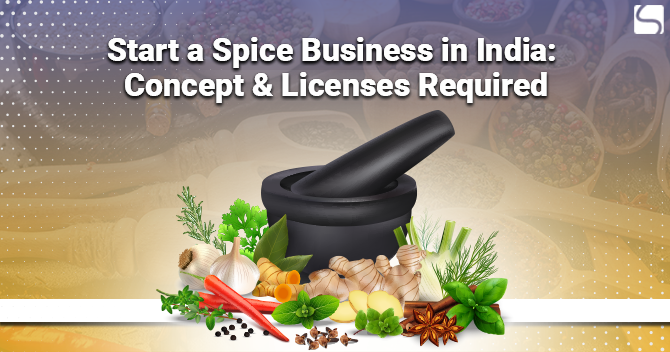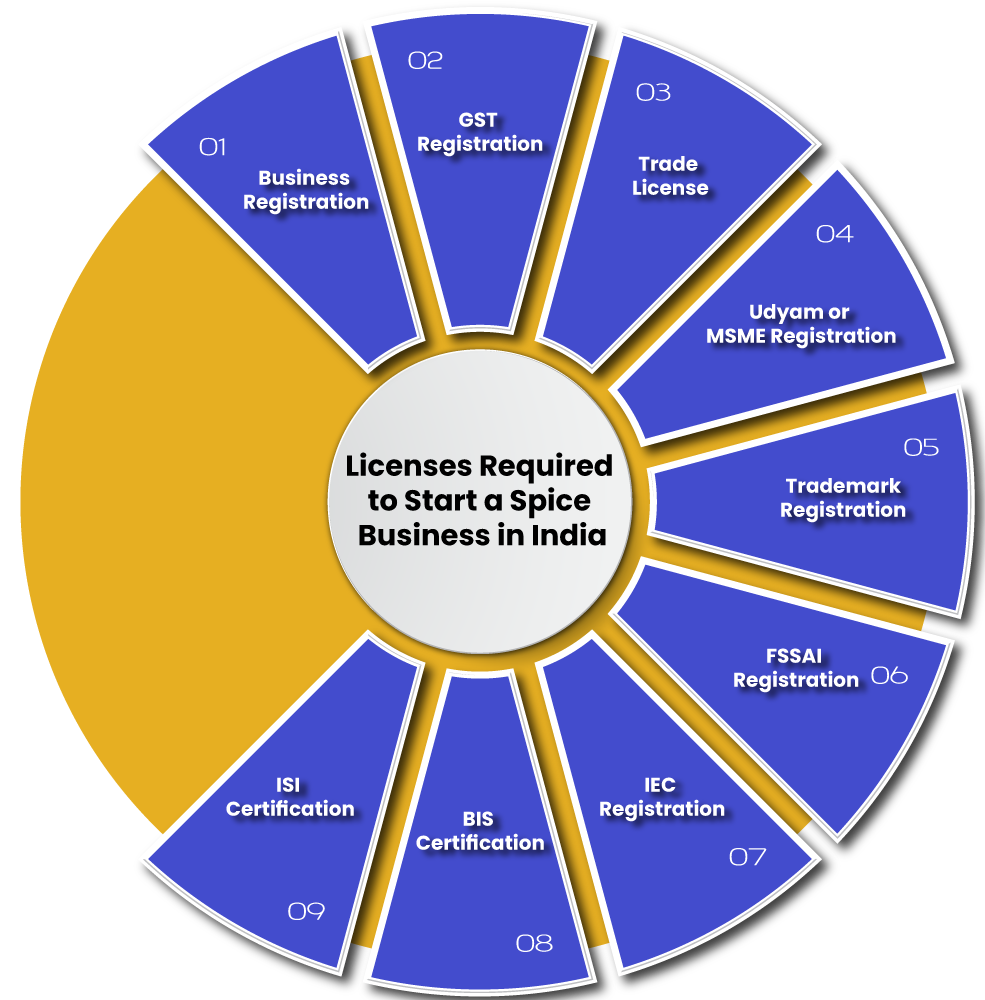Start a Spice Business in India: Concept & Licenses Required

Shivani Jain | Updated: Dec 29, 2020 | Category: Business, Business Plan
We Indian are fanatic when it comes to food, our day to day lifestyle, events, functions, and festivals are highly guided by spices. Although we are divided by states, the only thing that keep us connected is spice. Further, due to the aroma, taste, texture, and medicinal properties, of the spices we use, India is termed as “Home of Spices” at the global level. Not only are we the largest consumer of spices, but the biggest producer and exporter of the same as well. As a result, today, every embryonic entrepreneur wants to start a spice business in India.
In this blog, we will discuss the concept, process, and licenses required to start a spice business in India.
Table of Contents
Concept of Spice
The term “Spice” means seeds, roots, barks, dried fruits used to give aroma, colour, and flavour to food.
Further, there are various spices belonging to different regions, and countries are available in the arena. However, it shall be considerate to note that out of the 109 varieties of spices listed by ISO (International Organisation for Standardization), 75 types of spices are produced, consumed, and exported from India.
Some of the commonly used spices are as follows:
- Cinnamon;
- Black Pepper;
- Nutmeg;
- Cloves;
- Cumin Seeds;
- Coriander Seeds;
- Chili Powder;
- Ginger;
- Garlic;
- Turmeric;
Significance of Spices
It shall be pertinent to mention that apart from household consumption, most of the fast-food chains, such as Pizza Hut, Mc Donald’s, Starbucks, and Dominos are majorly inclined towards the use of the spices as follows to increase flavour in any product:
- Black Pepper;
- Chili Flakes;
- Parsley; and
- Dried Ginger Powder;
Also, restaurants, resorts, bars, and cafés aim to provide their customers with the taste of different food from selected regions, which is again a part of moving into global trends.
Growth of Indian Spice Market
In India, spices are prevalent, particularly as the gourmet food trend increases across the nation. Following are the statistics that show the predicted future growth of the Indian Spice Market:
- As per a report named “Value of Spices in the Retail Market across India”, published by Statista on 16.10.2020, the Indian Spice Market is projected to reach 950 billion rupees by the end of 2020;
- According to a report named “Spices Market Size, Share and Trends Report”, published by Grand View Research in the month of October 2020, the Global Spice Market is projected to grow at CAGR (Compound Annual Growth Rate) 6.5% from 2020 to 2027;
- Based on the report named “Spice Industry and Export in India”, published by India Brand Equity Foundation, in the month of November 2020, in the Financial Year 2020, spices worth the US $3.65 billion were exported from India;
- According to Mr K NirmalBabu, Director of IISR (Indian Institute of Spices Research) Kozhikode, the Indian Spice Market will reach the US $18 billion by the end of 2020;
- As per a report named “Indian Spice Market”, published by Zion Market Research, on 10.01.2020, the spice industry of India is projected to grow at a CAGR (Compound Annual Growth Rate) of 4.5% by the end of the year 2026;
- Based on a report named “India Organic Spice Market”, published by Market Research, in the month August 2020, the India Organic Spices market was assessed at around the US $200 million in the FY 2020 and is predicted to grow at a vigorous CAGR of 11% in the coming five years;
- According to a report named “Indian Spice and Spices Mix Market Outlook 2020”, published by Ken Research on 27.07.2015, the Indian Spice Market will cross the US $18 billion by the end of 2020;
- Based on a report published by Assocham, the export of Indian Spices rose by 23% to the US $359 million (approx. Rs 2690 crores) in June 2020;
- As per a report named “Organic Spices Market Analysis”, published by Market Data Forecast, in the month of February 2020, the Indian Organic Spice Market is anticipated to reach a value of US $22.98 billion by 2025;
Reasons to Start a Spice Business in India
The reasons for the growth of Spice Business in India are as follows:

- Growing Globalization;
- Increasing Demand for Authentic Food Cuisine;
- Continuous Launch of New Products;
- Includes Medicinal Properties;
- Rise in the Demand of Organic Spices;
- Increase in the Consumption of Packaged Foods;
- Rise in Disposable Income;
- Involves Less Chance of Contamination;
- Assurance of High Quality;
Key Market Players of Indian Spice Industry
The key market players of the Indian Spice Industry are as follows:
- Aachi Spices and Foods Private Limited;
- DS SPICSCO Private Limited;
- Jhaveri Industries;
- Mahashian Di Hatti Private Limited;
- MTR Foods Private Limited;
- Munimji Foods and Spices Private Limited;
- PatanjaliAyurveda Limited;
- Pravin Foods Private Limited;
- Ramdev Foods Products Private Limited;
- S Narendra Kumar & Company;
- TATA Chemicals Limited;
- Vasant Masala Private Limited;
Key Requirements to Start a Spice Business in India
The key requirements to start a spice business in India are as follows:

- Analyze the Cost Involved;
- Arrange the Space for Working;
- Procure the Required Raw Materials;
- Purchase Necessary Machinery;
- Undertake Manufacturing Process;
- Packing and Labelling of Final Product;
- Decide the Target Market;
Analyze the Cost Involved
Normally, the cost involved to start a spice business in India is low and comes around Rs 50000 to Rs 100000. However, the same depends on the types of spices and condiments one wants to deal with.
For Example: dealing in saffron will involve more cost than dealing in normal day to day spices.
Arrange the Space for Working
It shall be considerate to note that for starting a spice business in India, normally a place of 250 sq. yards is needed for the processing of spices, and other 250 sq. yards is required for the packing of the final products.
Procure the Required Raw Materials
The foremost important material for incorporating a spice industry is the raw material, i.e., ungrounded spices. Further, one can start a spice business in India by purchasing the following items wholesale:
- Red Chilies;
- Coriander Seeds;
- Cumin Seeds;
- Fennel Seeds;
- Fenugreek Leaves;
- Fenugreek Seeds;
- Mustard Seeds;
- Black Pepper;
- Poppy Seeds;
- Turmeric;
Also, Read: How to Start a Retail Shop in India? Factors & Licenses to Consider
Purchase Necessary Machinery
To start a spice business in India, one needs to have the proper machinery installed and other equipment to start the processing of raw spices and convert them into powdered spices.
However, it shall be taken into consideration that one must carefully choose those machines which include the latest developments and other specifications as per the business plan.
Further, the list of some of the equipment that one should buy to start a spice business in India are as follows:
- Grinding Machine;
- Impact Pulverizer;
- Double Stage Pulverizer;
- Hammer Mill;
- Spice Mill;
- Pounding Machine;
- Compressor;
- Disintegrator;
- Heat Sealing Machine;
- Packaging Machine;
- Roster;
- Sieves;
- Spice Grinder;
- Weighing Scale;
Undertake Manufacturing Process
The steps involved in the manufacturing of Spice Mix are as follows:

Cleaning
The first and the foremost step in the process to manufacture spice mix is to clean the raw spices, else the same can lead to several diseases. Further, the process of cleaning includes removing big physical impurities, such as dust, stones, dirt, etc.
Drying
Once the raw spices are fully clean, then now is the time to dry them up. Usually, businesses involve both sun-dried and artificial methods in the process of drying.
However, it shall be relevant to note that the process of drying depends on the following climatic conditions as well:
- Dry Season, i.e., during summers and autumn;
- Wet Season, i.e., during the rainy season;
- Cold Season, i.e., during winters;
Roasting
Now, in the next step, the spices are properly roasted after drying to infuse the color, aroma, and good taste to the final powdered spice.
Pulverizing/Grinding
After that, make use of Pulverizing or Grinding machines to grind the raw, whole spices into the final powdered form.
Grading
The process of grading is done based on the additions and proportion of the spice mix with their raw materials. Moreover, the same is graded on the basis of the flavour, size, shape, colour, and density of the spice.
Sieving
In this step, the powdered spices are sieved to confirm that all the spices have a uniform blend and size.
Packaging
Once all these steps are complete, the spices are then sent for the process of packaging. In this step, the powdered spice mixes are weighed and packed as per the pre-decided quantity that needs to be packed.
Sealing
Lastly, it is very important to seal each and every packet of spice mix properly. Further, the reason behind sealing is to prevent the wastage of the spice mix, preserve it from dust, moisture, pests, and insects.
Decide the Target Market
When the manufacturing process for the spice mix is complete, the next and the most important step is to decide the target market to sell and earn profits. Further, one can start by approaching the places as follows:
- Local Retail Market;
- Wholesale Market;
- E-commerce or Online Portal;
- Export
Licenses Required to Start a Spice Business in India
The licenses required to start a spice business in India are as follows:

Business Registration
To start a Spice business in India, firstly, one needs to get his/her company Incorporated as per the procedure prescribed under the provisions of the Companies Act 2013. Further, usually, it is advised to obtain One Person Company Registration for the initial business days.
GST Registration
Once the aggregate annual business turnover of a spice business crosses the target of Rs 40 lakhs, its owner needs to mandatorily apply for GST Registration, as the same will open new avenues for the business. However, it shall be relevant to note that for some special states, the said limit is reduced to Rs 20 lakhs.
Trade License
A Trade License is a document or certificate that gives permission to the proposed owner to commence his/her business activities in a particular area. Further, one can acquire a Trade License from the local or municipal authorities.
Udyam or MSME Registration
To avail of the benefits, subsidies, and privileges given by the government to MSMEs, one needs to apply for Udyam Registration or MSME Registration[1].
Trademark Registration
Nowadays, the case of duplication and imitation of the brand, logo, name, colour, design, etc., are rising at a mounting rate. Therefore, it becomes significant for everyone to preserve his/her brand logo from misuse, imitation, or duplication by others. So to secure, one needs to apply for trademark registration.
FSSAI Registration
As spice powder is a food item, so one compulsorily needs to apply for an FSSAI License or food operation license for starting the business operations in the food industry.
IEC Registration
If a business owner wants to export his/her spice blends or mixes, then, in that case, he/she needs to apply for an IEC Registration, as without IEC Code, one cannot start any import or export activity.
BIS Certification
One of the most important licenses to start a spice business in India is BIS certification, as the same confirms the quality of the ground spices. Further, the different ISI specification for ground spices are as follows:
- Black Hole and Ground ISI-1798-1961;
- Chili Powder ISI-2445-1963;
- Coriander Powder ISI-2444-1963;
- Curry Powder ISI-1909-1961;
- Modes of Sampling and Testing Spices and Condiments ISI-1997-1961;
- Turmeric Powder ISI-2446-1963;
ISO Certification
The main reason for obtaining ISO 9001 is to confirm that all the products and services that a company manufactures meet customer expectations and betters customer satisfaction. Therefore, it is compulsory for every business to obtain ISO Certification.
Conclusion
In a nutshell, Spices play a crucial role in enhancing the taste, aroma, and flavour of processed foods. Moreover, the medical industry, due to the properties of stimulating, carminative, and digestive, is a major consumer of spices as well. As a result, nowadays, everyone wants to start a spice business in India.
Further, for obtaining the licenses and permits required, visit Swarit Advisors, our experts are always ready to cater to all your needs.
Also, Read: Things to Remember Before Starting a Food Business in India














